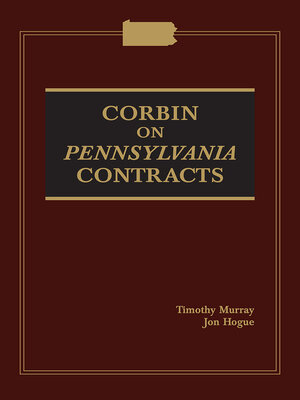
Sign up to save your library
With an OverDrive account, you can save your favorite libraries for at-a-glance information about availability. Find out more about OverDrive accounts.
Find this title in Libby, the library reading app by OverDrive.



Search for a digital library with this title
Title found at these libraries:
| Library Name | Distance |
|---|---|
| Loading... |
Expanding the influence and authority of the venerable Corbin brand, Corbin on Pennsylvania Contracts provides a comprehensive and accurate statement of Pennsylvania contract law in a readily accessible manner. Lawyers sometimes assume that contract law principles are uniform throughout the nation, but that's not true. Pennsylvania has a unique take on contract law—with holdings and rules of law that depart from the mainstream in significant respects. The only way to understand it is to carefully examine the judicial holdings applying Pennsylvania law. Corbin on Pennsylvania Contracts provides a comprehensive and accurate statement of Pennsylvania contract law in a readily accessible manner. It also demonstrates how Pennsylvania law differs from the majority or other prominent positions.
Important features of Pennsylvania contract law that the treatise explores in depth include the following topics:







